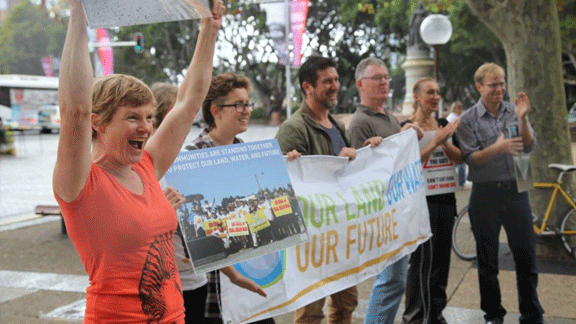Destroying a village to save... a coal mine

Five years ago, the 350 residents of the NSW village of Bulga, in the upper Hunter Valley outside Newcastle, discovered that the local Rio Tinto coal mine was planning to expand towards their homes.
Two years later, in 2012, the NSW Planning Assessment Commission (PAC) approved the company’s Mount Thorley-Warkworth mine expansion.
The residents weren’t going down without a fight. But two victorious court cases later, the NSW government has done what the courts failed to do for Rio Tinto.
Courtesy of ex-premier Barry “1959 Grange” O’Farrell, the residents can’t go to court again. PAC approvals can no longer be appealed there.
But the PAC has come up with a solution for them: Relocate the whole town to stop it getting in the way of the coal mine.
Unsurprisingly, Rio Tinto likes this plan. After all, it helped the government come up with it.
The best thing for profits (or, as company management prefers to say, for “the community”) would be for people and buildings to move as the never-ceasing noise, dust, vibration and lights of open-cut coal mining come within three kilometres of their doorsteps.
In addition, endangered habitats, sacred Aboriginal sites and the only natural barrier between the mine and the village would all be obliterated.
Documents obtained by an environmental group under freedom of information explicitly state that under the new laws it is the economic significance of the resource that is now the “principal consideration” for the PAC.
A final decision based on the PAC’s recommendation is expected in a few months. The residents of Bulga have a hard fight on their hands.
Like all successful capitalists, Rio Tinto has a well-deserved reputation for ruthlessness. And governments, the military and the laws have bent to their will.
The Bougainville copper mine, shut down by mass action by the island’s indigenous people in 1989, is principally owned by Rio Tinto. Since 2010, as mineral prices have risen, the capitalist vultures are once again circling over resource-rich Bougainville, trying to reopen it.
The property rights of business triumph over the human rights of indigenous populations. New PNG legislation in the pipeline – the Bougainville Mining Bill – is designed to criminalise resistance. For example, when the company first began marking out the mine in the 1980s, traditional landowners removed the survey pegs. The proposed legislation now adds a special section, “Injury to boundary marks”.
Elsewhere, Rio Tinto’s huge Oyu Tolgoi gold and copper mine in Mongolia’s Gobi Desert has diverted scarce underground water, on which nomadic peoples relied.
Everywhere Rio Tinto operates, it leaves a trail of environmental damage, clashes with indigenous groups and unsafe workplaces. According to global union federation IndustriALL, in the course of 2013, 40 workers are known to have been killed at Rio Tinto’s worldwide operations.
This is what the people of Bulga are up against.